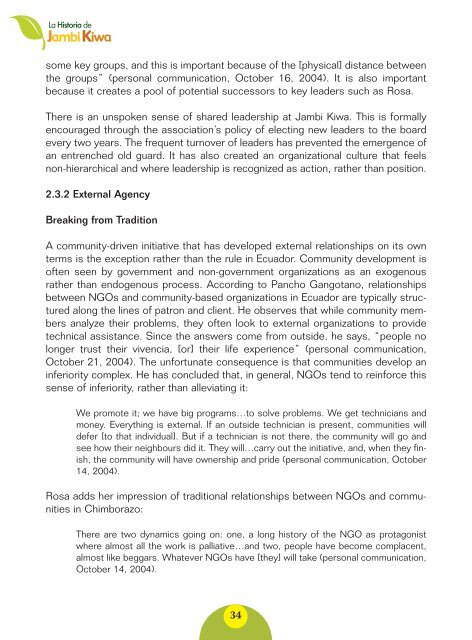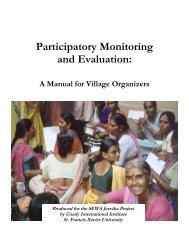Rosa's Story - Coady International Institute - St. Francis Xavier ...
Rosa's Story - Coady International Institute - St. Francis Xavier ...
Rosa's Story - Coady International Institute - St. Francis Xavier ...
Create successful ePaper yourself
Turn your PDF publications into a flip-book with our unique Google optimized e-Paper software.
some key groups, and this is important because of the [physical] distance between<br />
the groups” (personal communication, October 16, 2004). It is also important<br />
because it creates a pool of potential successors to key leaders such as Rosa.<br />
There is an unspoken sense of shared leadership at Jambi Kiwa. This is formally<br />
encouraged through the association’s policy of electing new leaders to the board<br />
every two years. The frequent turnover of leaders has prevented the emergence of<br />
an entrenched old guard. It has also created an organizational culture that feels<br />
non-hierarchical and where leadership is recognized as action, rather than position.<br />
2.3.2 External Agency<br />
Breaking from Tradition<br />
A community-driven initiative that has developed external relationships on its own<br />
terms is the exception rather than the rule in Ecuador. Community development is<br />
often seen by government and non-government organizations as an exogenous<br />
rather than endogenous process. According to Pancho Gangotano, relationships<br />
between NGOs and community-based organizations in Ecuador are typically structured<br />
along the lines of patron and client. He observes that while community members<br />
analyze their problems, they often look to external organizations to provide<br />
technical assistance. Since the answers come from outside, he says, “people no<br />
longer trust their vivencia, [or] their life experience” (personal communication,<br />
October 21, 2004). The unfortunate consequence is that communities develop an<br />
inferiority complex. He has concluded that, in general, NGOs tend to reinforce this<br />
sense of inferiority, rather than alleviating it:<br />
We promote it; we have big programs…to solve problems. We get technicians and<br />
money. Everything is external. If an outside technician is present, communities will<br />
defer [to that individual]. But if a technician is not there, the community will go and<br />
see how their neighbours did it. They will…carry out the initiative, and, when they finish,<br />
the community will have ownership and pride (personal communication, October<br />
14, 2004).<br />
Rosa adds her impression of traditional relationships between NGOs and communities<br />
in Chimborazo:<br />
There are two dynamics going on: one, a long history of the NGO as protagonist<br />
where almost all the work is palliative…and two, people have become complacent,<br />
almost like beggars. Whatever NGOs have [they] will take (personal communication,<br />
October 14, 2004).<br />
34








